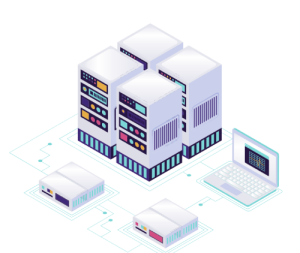A dedicated server is a server that usually offers total control. You can install any software, reboot the system, shutdown, and install and manage plugins. As with all hosting options, you have two basic flavors on dedicated servers, Windows™ and Linux.
You also have two options for your server, and that is managed and unmanaged.
The managed server is where the hosting company who owns the server will updated and offer some level of support if issues arise.
The unmanaged server is where you are responsible for keeping the software and plugins updated, and the hosting company who owns the server will offer little or no support. The most popular option because of the former is managed hosting. The positive part about using the dedicated server is that you have total control regarding the environment, and you are not operating in a shared environment where another webmaster also has hosted on your server.
The downside to dedicated servers is the cost compared to a VPS or shared hosting plan.
Dedicated servers are a popular choice for businesses and individuals who need full control over their hosting environment. Unlike shared hosting, where multiple users share the same server, a dedicated server is reserved for just one user. This setup gives you exclusive access to all the server’s resources, making it ideal for high-traffic websites, resource-intensive applications, or businesses that prioritize security and performance.
Table of Contents
ToggleKey Takeaways
- Dedicated servers provide exclusive access to server resources, ensuring optimal performance.
- They are ideal for hosting high-traffic websites and resource-heavy applications.
- Dedicated hosting offers greater security and customization compared to shared hosting.
- Users can choose between managed and unmanaged server options based on their needs.
- Dedicated servers are more expensive but provide unmatched reliability and control.
What Are Dedicated Servers?
Understanding the Basics of Dedicated Servers
A dedicated server is a physical machine that’s all yours. Unlike shared hosting, where you split resources with others, a dedicated server gives you full control over the hardware, software, and everything in between. Think of it like owning a house versus renting an apartment—you decide how to use the space, decorate it, and maintain it. This exclusivity ensures maximum performance and reliability for your online needs.
How Dedicated Servers Differ from Shared Hosting
Shared hosting is like living in a crowded apartment complex. Everyone shares the same pool of resources—CPU, RAM, storage—and if one neighbor throws a party (or gets a traffic spike), you might feel the impact. Dedicated servers, on the other hand, are like owning a private home. You’re not sharing bandwidth or processing power with anyone, so your site or application runs smoothly, no matter what.
Here’s a quick comparison:
| Feature | Shared Hosting | Dedicated Server |
|---|---|---|
| Resource Allocation | Shared with others | Fully yours |
| Performance | Can be inconsistent | High and reliable |
| Customization | Limited | Full control |
| Cost | Budget-friendly | Higher investment |
Key Features of Dedicated Servers
Dedicated servers come packed with features that make them ideal for businesses and projects with demanding needs:
- Full Control: You get to choose the operating system, software, and configurations.
- High Performance: With all resources dedicated to you, your site or application can handle heavy traffic and complex tasks.
- Enhanced Security: No sharing means fewer vulnerabilities, and you can implement your own security measures.
- Scalability: Easily upgrade hardware or software as your needs grow.
With a dedicated server, you’re investing in reliability, customization, and the peace of mind that comes with knowing you’re in control of your online presence.
For businesses in Omaha, Websnoogie’s state-of-the-art hosting services offer an excellent example of how dedicated servers can elevate your digital operations.
Benefits of Using Dedicated Servers
Enhanced Performance and Speed
When it comes to hosting, speed and reliability are everything. With a dedicated server, all the resources—like CPU, RAM, and bandwidth—are yours alone. This means your website or application can handle heavy traffic without slowing down. No sharing, no compromises—just consistent, high-speed performance. Whether you’re dealing with a sudden spike in visitors or running a resource-heavy app, a dedicated server keeps things smooth.
Greater Security and Control
Security is a big deal, especially if you’re handling sensitive data. Dedicated servers give you full control over your security settings, so you can customize firewalls, encryption, and other measures to fit your needs. Plus, without other users on the same server, there’s less risk of malware or breaches. Want to meet specific industry standards? A dedicated server makes that easier to achieve.
Scalability for Growing Businesses
Planning to expand? A dedicated server grows with you. You can add more storage, increase bandwidth, or upgrade hardware as your business demands. This flexibility ensures your hosting solution won’t hold you back. Whether you’re launching new features or expecting more traffic, your server can keep up.
Common Use Cases for Dedicated Servers

Hosting High-Traffic Websites
If your website gets a ton of visitors daily, a dedicated server is your best friend. Unlike shared hosting, where resources are split among multiple users, a dedicated server gives you the full power of the hardware. This means your website loads faster, handles spikes in traffic like a champ, and keeps your visitors happy. Whether it’s an e-commerce store or a popular blog, having a dedicated server ensures that your site performs consistently, no matter how many people are online.
Running Resource-Intensive Applications
Applications like data analytics, machine learning models, or even video editing tools need serious computing power. Dedicated servers are ideal for these tasks because they offer customizable configurations and high-performance hardware. You get to choose the processor, memory, and storage setup that fits your needs. Plus, you can tweak the settings to optimize for your specific applications. This level of control is a game-changer for businesses that rely on heavy-duty software.
Gaming and Multiplayer Hosting
For gamers and developers, a dedicated server is practically a must-have. It provides low latency, stable performance, and the ability to host multiple players simultaneously without lag. If you’re running a multiplayer game or even a private server for friends, a dedicated server ensures smooth gameplay. Customization options let you set up mods, unique game rules, or even custom maps, making the experience tailored to your liking.
Dedicated servers are versatile powerhouses that cater to a wide range of needs, from hosting bustling websites to running high-performance applications and gaming environments. They give you the control, speed, and reliability you need to succeed.
How Dedicated Servers Work
The Role of Data Centers in Dedicated Hosting
When you use a dedicated server, it’s not sitting in your office or basement (thankfully). Instead, it’s housed in a professional data center. These facilities are designed to keep servers running smoothly with features like climate control, backup power systems, and high-speed internet connections. Think of it as a secure home for your server, where it’s monitored 24/7 to ensure everything stays operational. Plus, data centers often have multiple layers of security, so your data is in safe hands.
Server Configuration and Management
With a dedicated server, you get full control over how it’s set up and managed. You can tweak the operating system, install custom software, and allocate resources like CPU and RAM as you see fit. If you’re tech-savvy, you might handle this yourself. If not, managed hosting providers can step in to take care of the nitty-gritty for you. Either way, the flexibility is all yours. This is one of the biggest perks of dedicated hosting—it’s your server, your way.
Understanding Uptime Guarantees
Uptime guarantees are a promise from your hosting provider that your server will be available a certain percentage of the time. For example, a 99.99% uptime guarantee means your server might only be down for a few minutes a month, if that. This reliability is crucial for businesses that can’t afford to have their websites or applications offline. Data centers and hosting providers invest heavily in redundant systems to make good on these promises, so you can trust your server to stay online.
Choosing the Right Dedicated Server

Factors to Consider When Selecting a Server
Picking the perfect dedicated server can feel like a big decision, but breaking it down into smaller parts makes it easier. Here’s what you should think about:
- Performance Needs: Are you running a high-traffic eCommerce site or a simple blog? The power of the processor you need depends on your workload.
- Bandwidth Requirements: If you’re hosting videos or expect heavy traffic, you’ll need plenty of bandwidth to keep everything running smoothly.
- Memory (RAM): More memory means faster load times and better performance. Even if you don’t need a ton now, it’s good to have room to grow.
- Operating System: Do you prefer Linux or Windows? This choice can depend on the software you plan to run.
Managed vs. Unmanaged Hosting Options
When it comes to managing your server, you’ve got two main options:
- Managed Hosting: The hosting company takes care of all the technical stuff—updates, security, and troubleshooting. It’s hassle-free but costs a bit more.
- Unmanaged Hosting: You’re in charge of everything. It’s cheaper, but you’ll need some tech know-how to handle server maintenance.
Budgeting for Dedicated Hosting
Dedicated servers aren’t the cheapest option, so it’s important to plan your budget carefully. Here are a few tips:
- Look for transparent pricing to avoid surprise fees.
- Compare features like storage, bandwidth, and support to make sure you’re getting your money’s worth.
- Think long-term—investing in a good server now can save you headaches (and cash) down the road.
Choosing the right dedicated server is all about balancing your needs, your skills, and your wallet. Take your time and think it through—it’s worth it for the peace of mind.
Security Features of Dedicated Servers

Built-In DDoS Protection
Ever worry about hackers trying to overwhelm your server with traffic? Dedicated servers often come with built-in DDoS protection, which means they’re designed to block malicious traffic before it even reaches your site. This is a huge plus for businesses that can’t afford downtime or security breaches.
Customizable Security Configurations
With a dedicated server, you’re in control. Want to set up a firewall? Go for it. Need specific encryption protocols? No problem. Unlike shared hosting, where you’re stuck with the provider’s settings, dedicated servers let you tweak everything to fit your needs. You can install custom software or adjust configurations to match your industry’s compliance standards.
Compliance with Industry Standards
If you’re in an industry like healthcare or finance, compliance isn’t optional—it’s mandatory. Dedicated servers make it easier to meet those strict regulations. You get to create a secure environment for sensitive data, ensuring it’s stored and transmitted safely. Plus, having your own server means you’re not sharing space with other websites that could jeopardize your compliance efforts.
Pro Tip: A dedicated server not only gives you more control but also reduces risks tied to shared hosting. It’s like having a private vault for your data instead of a shared locker.
Why Security Matters
When you’re running a website, especially for business, security isn’t just a nice-to-have—it’s a must. A secure server protects your customer data, your applications, and even your reputation. If your site handles sensitive information like credit card details, a dedicated server is the safest bet.
For example, Nebraska web hosting provides advanced security features like DDoS protection and regular updates, ensuring a safe online environment for businesses. This kind of setup is ideal for growing companies that need both flexibility and peace of mind.
Dedicated Servers vs. Other Hosting Options

Comparing Dedicated and VPS Hosting
When it comes to hosting, the choice between a dedicated server and a Virtual Private Server (VPS) often boils down to your specific needs. A VPS is like renting an apartment in a building—you share the space and resources with others but have your own private area. Dedicated servers, on the other hand, are like owning the entire building. You get full control, better performance, and no sharing of resources. If your website demands high performance and reliability, dedicated servers are the way to go.
| Feature | VPS Hosting | Dedicated Server |
|---|---|---|
| Resource Sharing | Shared with others | Fully dedicated |
| Performance | Moderate | High |
| Cost | Lower | Higher |
| Customization | Limited | Full |
Why Choose Dedicated Over Cloud Hosting
Cloud hosting is flexible and scalable, but it comes with its own set of trade-offs. While cloud hosting spreads your data across multiple servers, dedicated servers provide a single, physical machine that’s all yours. This means better security and more control over your data. Plus, with a dedicated server, you don’t have to worry about “noisy neighbors” affecting your performance, which can sometimes happen with cloud hosting.
Cost vs. Value Analysis
Yes, dedicated servers can be pricey, but the value they bring often outweighs the cost. Think about it—you’re paying for top-notch performance, enhanced security, and complete control. For businesses expecting high traffic or needing custom configurations, the investment in a dedicated server can result in fewer headaches and better long-term results.
Dedicated servers might seem like an upfront splurge, but they’re like buying quality tools—they save you time, hassle, and money in the long run.
Wrapping It Up
Dedicated servers might sound a bit technical, but they’re really just about giving you more control and reliability for your online needs. Whether you’re running a busy website, hosting a game server, or managing sensitive data, having a server that’s all yours can make a big difference. It’s like having your own private workspace—no sharing, no interruptions, just the freedom to do things your way. If you’re ready to take your online presence to the next level, a dedicated server could be the perfect fit. And hey, if you’re in Omaha, Websnoogie’s got you covered with affordable options and great support!
Frequently Asked Questions
What is a dedicated server?
A dedicated server is a type of hosting where an entire server is used by one user or business. This setup gives you full control over the server’s resources, making it ideal for websites or applications that need high performance and reliability.
How is a dedicated server different from shared hosting?
In shared hosting, multiple users share the same server and its resources, which can slow things down. A dedicated server, on the other hand, is reserved for just one user, offering better speed, security, and customization options.
What are the benefits of using a dedicated server?
Dedicated servers provide enhanced performance, better security, and more control over server settings. They are great for handling high traffic, running resource-heavy applications, and ensuring data safety.
Who should consider using a dedicated server?
Dedicated servers are ideal for businesses with high-traffic websites, online stores, gaming servers, or anyone needing strong security and the ability to customize server settings.
Are dedicated servers expensive?
While dedicated servers typically cost more than shared hosting, they offer better performance and reliability. They are a good investment for businesses that rely heavily on their online presence.
Can I manage a dedicated server on my own?
Yes, but it requires technical knowledge. Many hosting providers offer managed dedicated servers, where they handle maintenance, updates, and security, so you can focus on your business.
For more information, see: http://en.wikipedia.org/wiki/Dedicated_hosting_service





